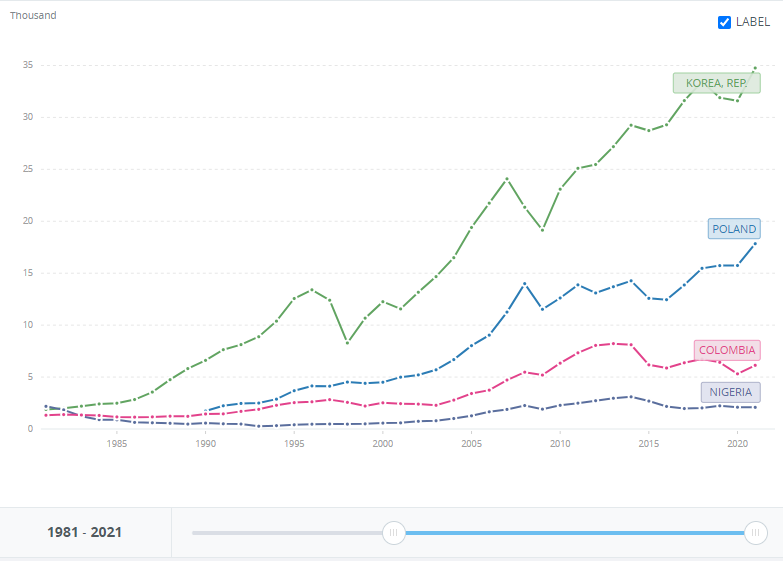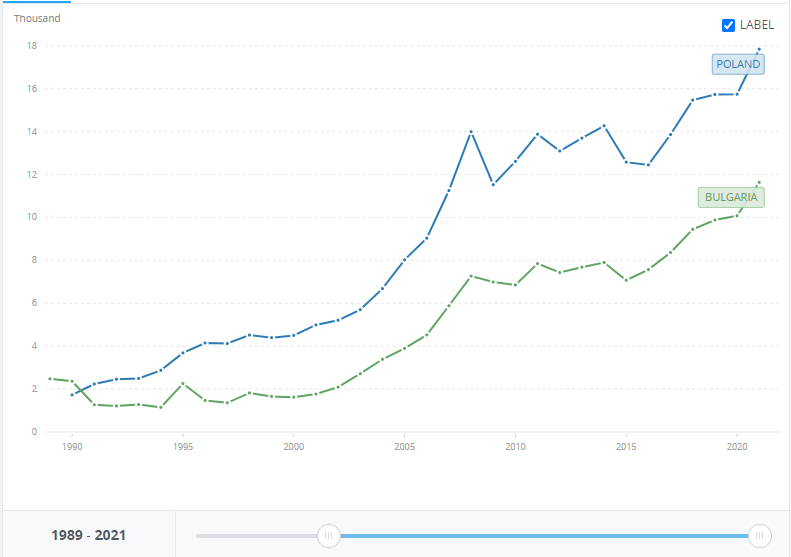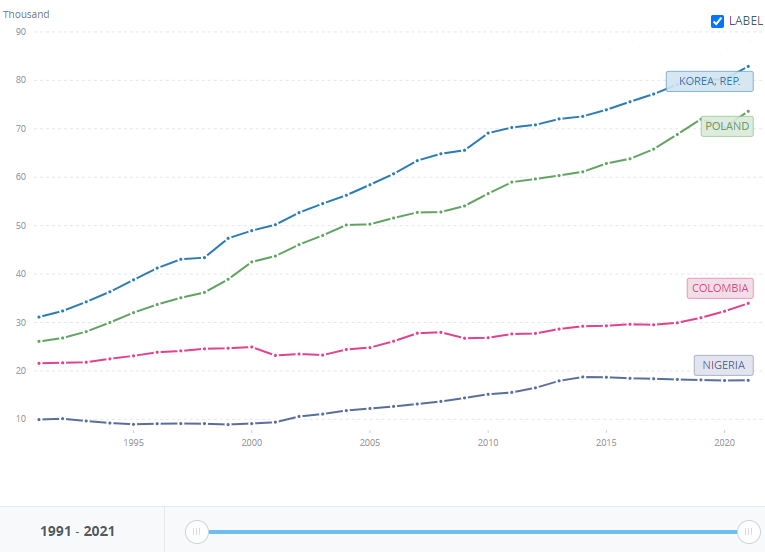The Curious Relationship Between The Economic Impact of Libraries and Rising Development Levels Across the Globe.
When I moved to Warsaw many years ago, I noticed how every single district in my city had at least one public library. Some of them had more. I lived in different parts of the city, and there was always one at least 500 meters from my apartment or place of work.
My wife took me to get a library card so I could take books home to read. The process was quick and hassle-free.
And then I compare that with my home town, in Brazil. Despite being located in the richest of all Brazilian states, my city (77 thousand residents) had only 2 public libraries. That means 2.6 per 100,000 inhabitants (keep this number in mind for our later comparisons).
When I found the database put together by the World Cities Culture Forum (WCCF) with the number of libraries per 100,000 people in different cities, these memories came back to me.
Check also: Hold Your Breath: The World’s Dirtiest Cities.
Public Libraries per 100,000 Residents in Multiple Global Cities
The database from the WCCF has multiple cities and sources from different years, ranging from 2014 to 2021.
In the list below, I ignored the data prior to 2017 (since it is likely too old, especially when we think about countries like China that have changed immensely in the last 5 years). Curiously, some of the most beautiful capitals in Europe are also among those with the most libraries.
| City | Libraries per 100,000 residents |
| Warsaw | 11.98 |
| Seoul | 11.5 |
| Paris | 8 |
| Helsinki | 5.7 |
| Milan | 5.4 |
| Edinburgh | 5.3 |
| Dublin | 3.8 |
| San Francisco | 3.4 |
| Toronto | 3.4 |
| Lisbon | 3.3 |
| Amsterdam | 3 |
| Montreal | 2.9 |
| Taipei | 2.85 |
| Tokyo | 2.84 |
| Buenos Aires | 2.8 |
| Cape Town | 2.6 |
| Los Angeles | 2.5 |
| Barcelona | 2.44 |
| Melbourne | 2.4 |
| Austin | 2.3 |
| Moscow | 2.3 |
| Guangzhou | 1.67 |
| Rome | 1.4 |
| Sao Paulo | 1.34 |
| Hong Kong | 1.1 |
| Brasilia | 1 |
| Singapore | 0.5 |
| Abu Dhabi | 0.41 |
| Istanbul | 0.3 |
| Bogota | 0.3 |
| Nanjing | 0.16 |
| Lagos | 0.1 |
A disclaimer: Nanjing may figure close to the bottom of the list, but this is due more to the fact that its massive Nanjing Library is actually multiple libraries put together under a single name, totaling more than 10 million books. That is why we will consider Lagos and Bogota instead of Nanjing as the two places with the lowest density of libraries.
The Economic Impact of Libraries: Poland and South Korea vs. Nigeria and Colombia
There are some interesting contrasts when we observe the cities in the two highest and lowest places in the table above.
Each one of the four cities is from a different continent, so Europe, Asia, Africa, and (South) America are all represented.
The second is that these four countries have very distinct histories.
The GDP per capita (or income per capita) of these four countries from 1981 to 2021 is shown below.

Nigeria was the richest of them in 1981, followed closely by South Korea and Colombia.
Poland at that time was still behind the Iron Curtain, so such data is not available; however, after the fall of communism in 1990, this information was also available there, and we can see that the income level of Poland was no different from Colombia, being also a poor country.
In other words, forty years ago, all these four countries were in a very similar situation.
Now, they are on extremely different paths. South Korea is now considered a developed country, while Poland’s economic growth is so strong that the country is attracting back its citizens who once emigrated to other European Union countries.
And here I am not only talking about comparing South Korea and Poland with Nigeria or Colombia.
Even when we make comparisons with similar countries, the performance difference is remarkable.
Bulgaria, for example, had a per capita income more than 30% higher than Poland only 30 years ago. Now Poland is significantly richer:

The same happens when we compare South Korea and Malaysia. They were in a very similar situation only 40 years ago. Now, South Korea has almost three times the Malaysian income per capita.

How could such an extraordinary change happen simultaneously on two different continents?
What Really Made Them Richer?
Probably by now, some of my readers are already foaming at the mouth to tell me that I am creating some spurious correlation by establishing a causal link between more libraries and higher income growth.
But that is not what I am doing here, although I recognize the positive economic impact of libraries.
It was not the opening and development of hundreds of libraries that made South Korea and Poland jump ahead of other economies. Today South Korea is a tech center while Poland attracts international students from the rest of Europe.
But the impressive number of libraries per 100,000 residents both in Warsaw and Seoul is a proxy indicator of something much larger that went on in these two countries during the last two decades.
The Spectacular Leap in Education and Productivity
The high number of libraries is not a cause by itself but only an indicator of heavy investments made by governments in increasing literacy rates and access to knowledge.
That, ultimately, results in increased productivity per worker.
Check also: Polish habits that increase productivity.
Imagine the case of a farmer who produces 80 bushels of corn per acre on his family farm. If he is illiterate, he can only access the mouth-to-mouth knowledge obtained in the local markets or from his agricultural traditions, with nearly no knowledge of modern processes.
Teach this farmer to read, and he may discover a new method of sowing or a new fertilizer that will increase his yield to 120 bushels of corn per acre. His income (if prices remain stable) will skyrocket by 50%.
This simple example using agriculture could be expanded to numerous other fields, like services or industry. The productivity boost caused by increased access to knowledge is nicely captured by an indicator called GDP per person employed, which you may see below:

Important to say that while these countries quickly developed, there are other problems that emerged in the meantime. For example, South Korea nowadays is one of the countries with the worst work-life balance.
Thoughts?
If you enjoyed this article about the economic impact of libraries, here are a few other reading suggestions for you:
Why This Certain African Country Is Growing So Fast?
A Guide to the Easiest Countries to Adopt a Baby From
What to Do in Warsaw in One Day
The Dreamy Destination That’s 50% Cheaper to Live In than Spain or Florida
Subscribe (for free) to receive my articles directly in your inbox and receive a special gift. If you enjoy this article, please consider becoming a Medium member by using this link and have access to premium, unbiased content from authors not tied to big media.
Levi Borba is the founder of The Expatriate Consultancy, creator of the channel The Expat, and best-selling author. Some of the links of this article may be affiliate links, meaning that the author will have a commission for any transaction.




